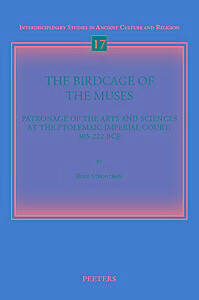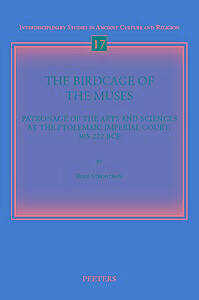
- Retrait gratuit dans votre magasin Club
- 7.000.000 titres dans notre catalogue
- Payer en toute sécurité
- Toujours un magasin près de chez vous
- Retrait gratuit dans votre magasin Club
- 7.000.000 titres dans notre catalogue
- Payer en toute sécurité
- Toujours un magasin près de chez vous
The Birdcage of the Muses
Patronage of the Arts and Sciences at the Ptolemaic Imperial Court, 305-222 Bce
R Strootman
74,00 €
+ 148 points
Description
In the third century BCE, the Ptolemaic imperial court at Alexandria was the unchallenged center of culture and learning in the Hellenistic world. Backed by the vast wealth and prestige of the Ptolemies, the city of Alexandria became the symbolic capital of the world, the main hub of a dynamic imperial network that stretched from the Indian Ocean to the Black Sea. Many poets, philosophers, inventors, geographers, and other men of letters migrated to that center to enjoy the generous patronage of the Ptolemies. The Birdcage of the Muses is the first book-length historical study of the golden age of Ptolemaic cultural and scientific patronage. Working from new approaches to premodern imperialism, Rolf Strootman reconsiders the significance of Hellenistic court poetry from the perspective of current empire studies and the sociological study of the court, arguing that artistic, scholarly and scientific production contributed to processes of elite integration in the heterogeneous imperial world system controlled by the Ptolemies. Rejecting the modernist view that poets, scholars and technicians were autonomous outsiders to court society, the author is able to place these men in the social milieu of the court, showing how their professional behavior was ruled by the same mechanisms of gift exchange, etiquette and competition that determined court society as a whole. The Hellenistic Age was a period of intensified globalization, and it was through the royal court that writers and scientists were able to gain access to the extensive elite networks that connected communities throughout the Mediterranean and beyond. Literary authors in particular contributed themselves to the growth of interconnectivity by creating a common 'Hellenistic' imperial culture and language, and through the expression of imperial themes, notably the idea that the civilized world was, or ought to be, a single oikoumene of which Alexandria was the glorious, magnetic heart.
Spécifications
Parties prenantes
- Auteur(s) :
- Editeur:
Contenu
- Nombre de pages :
- 197
- Langue:
- Anglais
- Collection :
- Tome:
- n° 17
Caractéristiques
- EAN:
- 9789042933507
- Date de parution :
- 22-06-17
- Format:
- Livre broché
- Format numérique:
- Trade paperback (VS)
- Dimensions :
- 160 mm x 239 mm
- Poids :
- 249 g







